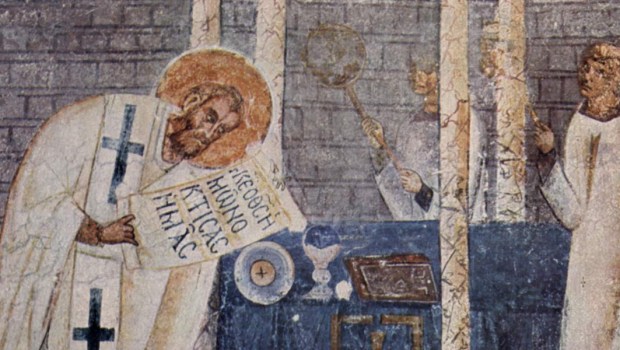The wisdom of the Desert Fathers has the power to transform our daily lives.In the Catholic Church, the practice of dedicating oneself to God within a community — known as consecrated life — developed along two different branches.
There’s Eastern Monasticism, with its distinct set of rules and way of life, and then the Western sort. In fact, Eastern Monasticism influenced St. Benedict in the founding of “Western Monasticism.”
Eastern Monasticism’s spiritual roots can be traced back to St. Paul the Hermit in the third century and St. Anthony the Great shortly thereafter. However, it wasn’t until St. Basil of Caesarea (and St. Pachomius) that Eastern Monasticism became more formalized. Around 357, St. Basil traveled to Palestine, Egypt, Syria and Mesopotamia to study the lives of these monastic communities to discover their secret to holiness.
While he admired the severe asceticism and devout life of prayer that the hermit-monks lived, Basil thought the monasteries needed balance. He eventually wrote a type of “rule” that governed the daily lives of the monks and moderated their extreme way of life. It met with great success, and for this Basil would later be known as the “Father of Eastern Monasticism.”
A life completely dedicated to God has much to teach us in the 21st century. The wisdom of St. Basil and the Desert Fathers has influenced countless saints throughout the centuries and is still relevant today. Here are four spiritual lessons that we can learn from Eastern Monasticism and apply to our everyday life.
1. Pray without ceasing
St. Basil writes: “Ought we to pray without ceasing? Is it possible to obey such a command?… The strength of prayer lies rather in the purpose of our soul and in deeds of virtue that extend to every part and moment of our lives. ‘Whether you eat,’ it is said, ‘or drink, or whatever you do, do all for the glory of God.’ As you take your seat at table, pray. As you lift the loaf, offer thanks to the Giver… As you are putting on your tunic, thank the Giver of it. As you wrap your cloak about yourself, feel yet greater love to God, Who alike in summer and in winter has given us coverings convenient for us, at once to preserve our life and to cover what is unseemly. Is the day done? Give thanks to Him Who has given us the sun for our daily work, and has provided for us a fire to light up the night.”
Essentially, live in a spirit of thanksgiving, remembering God in every activity. By doing this, we can live St. Paul’s exhortation to “pray without ceasing.”

2. Refresh your soul with a weekly “desert”
In a letter to St. Gregory Nazianzus, Basil writes: “Quiet is the first step towards the cleansing of the soul. Solitude is of the greatest use, inasmuch as it stills our passions, and gives room for principle to cut them out of the soul.”
There is a reason why God gave us a weekly sabbath. We need to rest, refresh our soul and practice quiet. We are not made to work seven days a week. When Sunday comes around, try to make it a day of rest and solitude (according to our state in life).
3. Serve the poor at all times
While the monks of the Egyptian desert typically did not see many visitors, St. Basil advised his monks to serve the poor as much as possible. The monks did this first and foremost by giving all of their possessions to the poor, but then continued to support the poor through their work in solitude.
St. Basil reminded the monks that their retreat from the world did not exempt them from serving others, but that their Christian faith had to be shown through their concern for the poor.
4. Fast when trying to root out a particular sin
Fasting from food can be difficult, but the Desert Fathers saw it as a primary means of rooting out sin in a person’s life. This comes from the thought that since sin is derived from our bodily passions, if we restrain ourselves in our bodily passion for food, we will be better strengthened against other wayward passions.
When fasting, St. Basil urged moderation and to consider one’s health and duties before engaging in anything extreme. Fasting is a worthy spiritual practice, but should not be done in a spirit of competition, trying to see how long a person can abstain from food (as was the case in many of the early monasteries).



